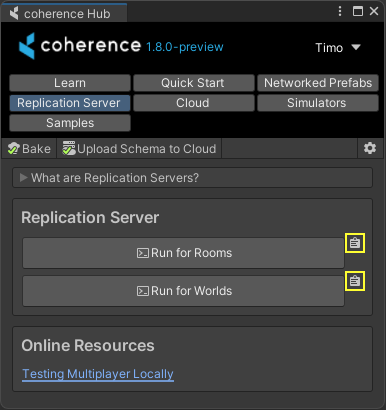Replication Server CLI
Command-line interface tools explained
World
--log-target=LOG-TARGETS One or more log targets separated by comma or in separate arguments (console|file):(plain|colored|json):(trace|debug|info|warn|error):[filePath]
--log-file=LOG-FILE-STRING [Obsolete - use --log-target] Log output file.
--log-level=LOG-LEVEL-STRING [Obsolete - use --log-target] The log level.
--log-format=LOG-FORMAT [Obsolete - use --log-target] Output format of the log.
--eula If true, prints the end-user license agreement and quits.
--env="enduser" Environment in which the server is executed.
--local-ip-override="127.0.0.1" IP to bind the http servers to.
--port=0 [Obsolete] The port to listen to.
--stats-port=32000 The port to listen for stats scrapers. Also enables pprof.
--udp-port=32001 The port to listen to.
--tcp-port=32001 The port for TCP to listen to.
--signalling-port=32002 Port for signalling, only used if --web-support is true.
--web-port=32003 Port for webrtc, only used if --web-support is true.
--api-port=32004 The port for API to listen to.
--ping-port=0 The port for ping service to listen to. Service disabled if 0.
--ping-rate-limit=1000 Maximum pings per second for the ping service. Use 0 to disable rate limiting.
--use-p-prof Enable pprof on APIPort.
--frequency=20 [Obsolete] use SendFrequency instead.
--send-frequency=20 The server send frequency.
--recv-frequency=60 The server packet receive frequency packets/s. Packets received faster than this will be dropped and the connection throttled.
--disable-throttling Disable all packet throttling. Best used with 3rd party network relays that already support DDOS detection and throttling.
--schema=STRING The schema file (.schema).
--disconnect-timeout=5000 Disconnect timeout (in milliseconds).
--retry-delay=1000 Connect retry delay (in milliseconds).
--debug-streams Use debug streams.
--max-entities=65536 Maximum number of entities allowed.
--max-clients=200 Expected maximum number of Clients.
--max-queries-per-client=15 Maximum number of queries per Client allowed.
--min-query-distance=0.1 Minimum distance for query change.
--web-support [Deprecated] Does this support web connections.
--public-ip="" Public IP of the Replication Server, used by WebRTC.
--out-stats-freq=1 Frequency, in seconds, of updates to prometheus stats.
--log-stats-freq=0 Frequency, in seconds, of output of stats to INFO logs. 0 - no output.
--secret="local-development" Secret used for API request and client authentication. The default value is used during local development only.
--project-id="local" ID of the project as assigned by the portal.
--unlock-token="" Token to remove RS restrictions.
--analytics-enabled
--version-override="" Override the RS version. For debug purposes.
--auto-shutdown-timeout-ms=0 Empty Replication Server auto shutdown timeout (in milliseconds), minimum 10000, disabled if 0.
--host-authority-features=,... Set which host authority features are enabled for this World.Rooms
Was this helpful?


